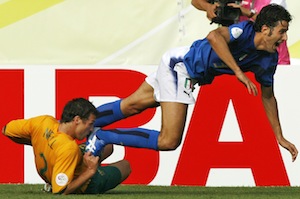
Australia's Lucas Neill, bottom, trips Italy's Fabio Grosso in the penalty box during the last minutes of the Australia vs Italy Round of 16 World Cup soccer match at Fritz Walter Stadium in Kaiserslautern, Germany, Monday, June 26, 2006. Italy was awarded a penalty and won the match 1-0. AP Photo/Kevork Djansezian
As Kamil Kopunek scored Slovakia’s third goal to make the seemingly impossible inevitable, FIFA’s commentator on the international feed declared that Italy were going out of the World Cup in “disgrace”. It was a piece of hyperbole that I took umbrage with as, in my opinion, there’s no disgrace in simply losing.
It’s how you do so that defines such a loss.
Otherwise Australia went out in disgrace as well, and we all know that’s simply not true.
However, some are arguing that because of their playacting and diving antics, Italy’s tournament exit is in fact a shameful one. Certainly that’s the opinion a lot of Australians are taking.
There’s no doubt about it, some of the behaviour we’ve seen from the Azzurri in this tournament goes against the concept of “fair play” that Australians believe in so adamantly.
I get asked a lot of questions about Italian football and these very issues but there’s one thing that I’m rarely asked: why do Italians dive?
The answer is it’s a cultural thing and not just at a sporting level but socially as well.
As John Foot wrote in his exceptional history of Italian football “Calcio”, when playing football Italians “dive, appeal for throw-ins after clearly kicking the ball out, crash to the ground screaming with pain when they have not been touched, try sneaky handballs. They also complain, constantly, about everything. Football games, like prison riots, are ‘essentially contested’.”
In other words, winning fairly is a secondary notion that comes way behind the importance of simply winning.
This might seem a little hard to grasp, all the more so if you’ve never lived in Italy, so let me put it into another context.
In Sicily there is a popular saying that roughly translates into: “Whatever you want to do, you do.”
That idea is responsible for why you so often see cars triple parked along busy Sicilian roads.
If you’re Italian and you see some space along the side of a road, and you’re in a car looking for a park, and your car fits that space, then it’s a “car park”.
For various social and political reasons in Italy, rules and laws often hold little traction.
Now, I’m neither arguing for nor against this sort of behaviour, but it’s important to understand the cultural reasons before you criticise the behaviour of a different country’s players.
It’s also worth remembering that Italy isn’t alone in supplying this World Cup with its share of gamesmanship. Plenty of sides have been guilty of similar acts including Slovakia, Brazil, Serbia, Germany and, guess what, Australia.
There was a moment in the Socceroos’ final group game when Luke Wilkshire was clipped by a Serbian player and flung himself to the ground. After rolling along the ground in “pain” for a while, the Dynamo Moscow player realised the referee wasn’t going to pay a free-kick and got back onto his feet.
It might not be on the same scale as some of our opponents, but Australians dive to.
So if it’s so despised at home, why do Socceroos play act?
I suspect it’s because everyone else does. How many times in the past have you heard guys like Harry Kewell saying, “We have to be smarter,”?
The thing is Kewell is wrong. One of Australia’s greatest assets is the “Aussie spirit” and being “smarter”, also known as cheating, goes against that very notion.
English football is, and arguably always has been, filled with all these sorts of gamesmanship problems. Yet for a long time European football has looked up to that English spirit of fair play and admired it.
It’s a pedestal Australian football should be looking to climb up on to. It’s far too easy to take the low road, and all the more less satisfying.
When Fabio Grosso hit the deck against Australia a nation mourned being felled by such cheating. The Italian left-back admitted as much to me almost four years later.
Unfortunately even now on all we hear about is how an Italian dived. Not how Tim Cahill didn’t close down Francesco Totti, allowing him to spot Fabio Grosso one on one with an out of position Mark Bresciano. Nor do we hear complaints that when Grosso turned Bresciano, Lucas Neill did the one thing a defender shouldn’t and go to ground in the penalty box.
I guess it’s far easier to focus on the mistakes of others than your own.





























































































